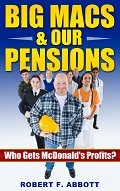Mutual Fund Definition
By: Robert F. Abbott, freelance writer and author of Big Macs & Our Pensions
If you’re new to investing, you may have heard about mutual funds, but not really known what they are, or how they can help you save and grow your money.
You’ll see a link below to a definition at BusinessDictionary, which provides some technical details, and after that I’ll provide a couple of mutual fund definition of my own, as well as another link that leads to a longer explanation…
What is a mutual fund? definition and meaning
Definition of mutual fund: An investment vehicle managed by finance professionals that raises capital by selling shares (called units) in a chosen and balanced set of securities to the public. A mutual fund’s capital is invest…http://www.businessdictionary.com/definition/mutual-fund.html
In a broader sense, though, think of a mutual fund as a group exercise in buying stocks, bonds, and other securities. As a group, you can get better prices (lower costs), greater diversity (more types of securities), and save time (getting together to hire an expert).
At the same time, there are also some disadvantages, including the fact that you still bear some risk; if the prices of the securities in which your fund invested go down, then the value of your mutual fund will go down.
However, keep in mind that doing nothing but leaving your savings in a bank account or low-interest deposit scheme also poses a couple of risks: inflation and taxes may take away more than you earn.
If I were to ask the question, “What is a mutual fund?” again, one of the best definitions might be that it is the best way for an investing newcomer to get started. It removes many of the hard decisions that investors and stocks and bonds must make before they buy or sell a single security.
Do your homework on information sites like this one, make a plan, and then act.
Here’s more on What is a Mutual Fund?
The Writer
Robert F. Abbott
In this book, you will:
- Discover the Ownership Revolution, and what it means to your retirement funding.
- Find out how much of your lunch bill is a profit for McDonald’s, and who gets the profits.
- Learn how corporate profits fuel one of the greatest social programs ever developed.
Click here to read a free preview at Amazon.com